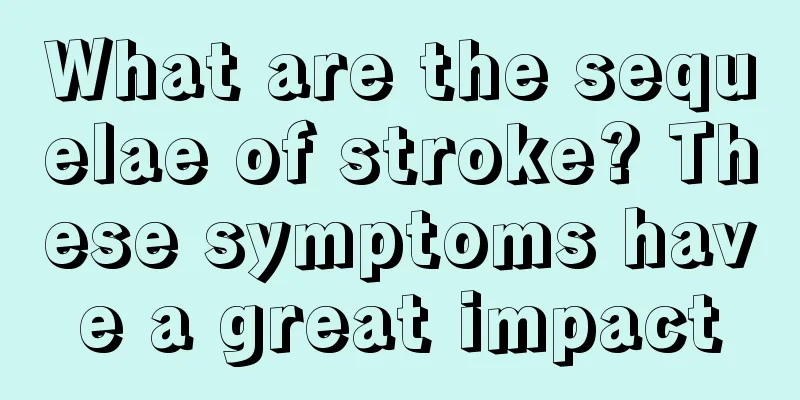What are the sequelae of stroke? These symptoms have a great impact

|
A stroke can easily leave some sequelae, including disorders in language, movement, cognition, and activity, numbness in the limbs, crooked mouth and squinting eyes. Stroke patients must be well cared for, have a nutritious diet, drink plenty of water, and maintain an optimistic and positive attitude. 1. Common sequelae of stroke are as follows 1. Numbness: The affected limbs, especially the extremities, such as fingers or toes, or the cheek skin on the hemiplegic side have a crawling sensation, a tingling sensation, or a slow response to stimulation. Numbness is often related to weather changes. The numbness is particularly obvious when the weather changes suddenly, when it is hot and humid, before and after rain, or when the weather is cold. 2. Crooked mouth and slanted eyes: paralysis of the facial muscles below the eye bag on one side. The symptoms include shallowing of the nasolabial groove, drooping corners of the mouth, and exposed teeth. When puffing the cheeks and whistling, the corners of the mouth tilt toward the healthy side and drool, which is more obvious when talking. 3. Central paralysis: Central paralysis is also called upper motor neuron paralysis, or spastic paralysis and scleroplegia. It is caused by damage to the pyramidal cells in the motor area of the cerebral cortex and the nerve fibers they send out - the pyramidal tracts. Due to damage to the upper motor neurons, they lose their inhibitory and regulatory effects on the lower motor neurons, causing the reflex function of the spinal cord to be "released" and resulting in weakened or absent voluntary movements. Clinically, the main manifestations are increased muscle tone, hyperreflexia of the tendons, pathological reflexes, and spastic paralysis. 4. Peripheral paralysis: Peripheral paralysis, also known as lower motor neuron paralysis, or flaccid paralysis, soft paralysis. It is paralysis caused by damage to the anterior horn cells of the spinal cord, the motor nuclei of the brainstem, and the nerve fibers they send out - the ventral roots of the spinal cord, spinal nerves, and cranial nerves. Due to damage to the lower motor neurons, the muscles they control do not receive the necessary impulses and excitement, which manifests clinically as decreased muscle tone, weakened or absent reflexes, accompanied by muscle atrophy, but no pathological reflexes. 2. Nursing for post-stroke sequelae (1) The diet should be nutritious, easy to digest, and must meet the needs of protein, vitamins, inorganic salts and total energy. (2) Drink more water and eat more semi-liquid food. Paralyzed patients should have adequate water supply. Drinking 1 to 2 cups of salt water in the morning can prevent constipation. The daily diet should include both dry and liquid food, rice and soup, and often eat thin porridge. For a few people who do not want to drink water, they can eat some juicy fresh fruits appropriately. Drinking more soup can prevent constipation and urinary tract infections. (3) To increase gastrointestinal motility, food should not be too refined. It is necessary to eat appropriate amounts of high-fiber foods to prevent constipation. (4) Avoid strong tea, alcohol, coffee and spicy food. |
<<: What to eat for stroke patients, dietary precautions for patients
>>: Acupuncture treatment for stroke sequelae has very good results
Recommend
What's the matter with the sunken forehead
A sunken forehead may be due to congenital develo...
What are the transmission routes of hand, foot and mouth disease?
How hand, foot and mouth disease is spread: Mode ...
What medicine can I take to relieve vomiting after chemotherapy
Chemotherapy can play a very good therapeutic rol...
The dangers of dropping essential oil on the belly button
Everyone loves beauty. Some people think that dro...
What causes chest tightness and back pain?
If you experience chest tightness and back pain, ...
Why do we sweat so much in summer
Sweating in summer is a normal physiological phen...
What are the contraindications of interventional treatment for liver cancer? Some common sense about interventional treatment for liver cancer
Interventional therapy is a method of treating li...
What to do about edema caused by radiotherapy for nasopharyngeal carcinoma
What should I do if nasopharyngeal carcinoma edem...
3-ingredient formula for laryngeal cancer
The method of holding the medicine in the mouth t...
Is percutaneous interventional treatment for lung cancer chemotherapy? No
Percutaneous interventional treatment for lung ca...
The skin is red and round and peeling
The main reason for red, round and peeling skin s...
Can melanoma be cured?
Can melanoma be cured? Melanoma is a common skin ...
What is the cause of sore throat and low fever
Fever is a relatively common symptom, mainly when...
How to treat bulging eyes
Some people's eyes look watery, big and very ...
What should you pay attention to in summer for rheumatism
Rheumatism is a health problem that troubles many...









